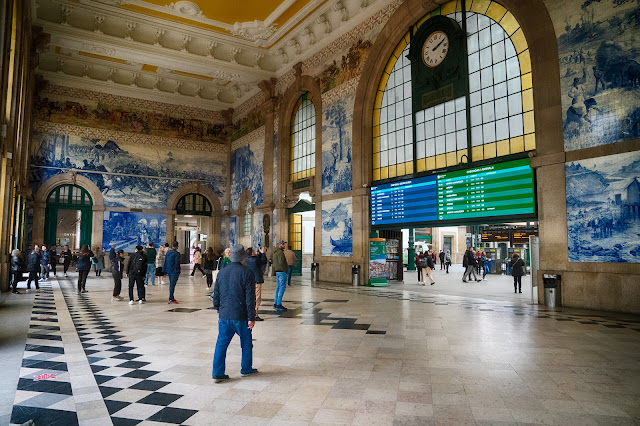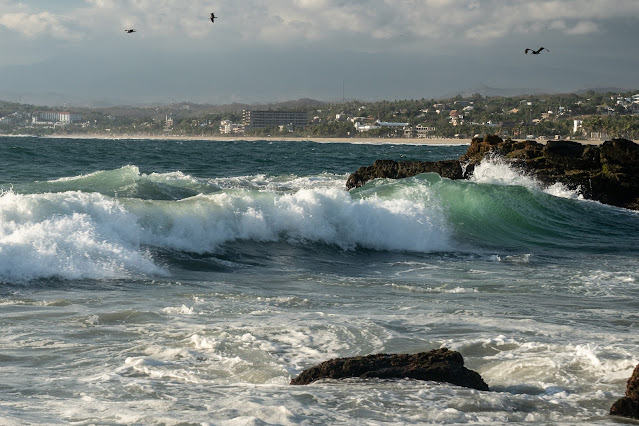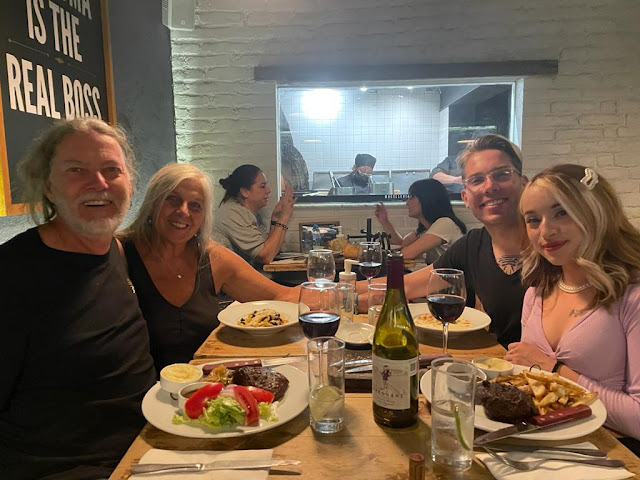I grew up in Kimberley - a city in the middle of the Karoo with hot summers and cold winter nights. Most of my social life revolved around the English Baptist church where we spent a great deal of time on Fridays and Sundays.
Of course the attraction of this social life involved the normal dynamics of teenagers hanging out together and we had a group of friends that we cultivated over those years and then lost touch with once we all moved on. When Facebook exploded onto the scene in the early 2000's I reconnected with a few of them even though our lives were far apart and we had evolved into people in some ways quite different from those young kids teasing and joking with each other at church gatherings.
Among these friends were two attractive girls with infectious laughs whose parents were Portuguese. Their mother who was very direct, taught me how to greet people in Portuguese when I visited them a few times at their home. I've been using those few words quite a bit since we made the trip to Portugal this month.
I had reconnected briefly with both of them when we were living in Grahamstown about 8 years after I left Kimberley and then lost touch again when we moved to the USA 15 years later. At some point I learned that Armanda, the younger of the two, had moved to Portugal. So before we left for Portugal I made contact with her through her sister-in-law, because neither of them are on Facebook and Anne and I asked if we could add a stop to visit her on our way down from Porto to the Algarve.
But first we spent a total of 8 days in Porto, taking time to visit the center of the city twice - the first I have written about in a previous post.
The second trip was to see a famous bookshop that had been a frequent stop for J.K. Rowling when she had taught English in Porto years before she wrote the Harry Potter books. The bookshop is described as the most beautiful in the world and it has a reputation for being the inspiration for some of the settings described in the Harry Potter books. On any given day there are lines of people waiting to go inside for an Instagram moment.
You can get a ticket to visit online for 5 Euros but it can be used against a book purchase so entrance ends up being free if you buy a book.
The entrance to the bookshop has beautiful wood panels and elaborate carved stairs curving up to the upper floor. Despite the crowds, we were able to make our way through the shop and Anne bought a couple of books while I photographed the interior.
A large silver display booth houses a framed letter from a 19 year old Robert Zimmerman (Bob Dylan) to a woman named Barbara describing a dream he had had about her. It turns out that the bookshop paid over half a million dollars (which was more than double the expected price) to win the collection of 42 letters at an auction in the USA.
Our feelings about Porto were a little colored by Anne getting sick and the fact that it rained for most of the time in an AirBnb that appears to be less than waterproof but we did have a few sunny days at the tail end and were able to walk daily along the long beach of Matosinhos (pronounced Mah-tuzi-nush).
The waves were pretty wild, breaking quite a bit further out than those we'd seen on the south coast of Mexico. There was lots of evidence of surf schools and it seems like a beach very well suited to that.A walled structure at one end of the beach is a castle called Castelo do Queijo which is thought to have been built by the Celtic tribe called the Draganes who arrived in the 6th century. Porto has emblems showing a dragon in various places and their football (soccer) team is nicknamed Dragōes probably after these original Celts.
The view of the beach from near this structure is impressive and we spent an hour walking there and watching the waves on our second last day.
The Friday I took a day off work because Armanda and her husband had invited us to stay with them and I figured it would be pretty rude to spend that night working. We caught a train from Porto to Santarem - a two and a half hour trip through some countryside that reminded us of the west coast of South Africa and of the countryside outside of San Franciso.
We pulled into the small station and were picked up by Armanda and her husband Luis, and taken to their home for lunch and some conversation before heading out for a walk around the town. Armanda has not changed at all, other than the greying of her hair, and it amazes me how easily we reconnect with people we haven't seen for years - so much common ground and history that ties us together. They are such a lovely couple.
We took a walk through the town and there was a sense of tranquillity there.
So, in addition to the somewhat empty streets there were a few that had evidence of many shops that had closed down and were shuttered.
The walk took us past a few old buildings and into a few beautiful cathedrals to a small park with stone walled structures called Portas do Sol (doors of the sun)
which look out over the river Teju (Tagus in English) which is the main river of Portugal - originating in Spain and providing the wide deep river that the Romans used to establish the port of Lisbon.There is a building called the Torre das Cabaças because it has eight calabashes (gourds) mounted on the tower - local lore has these as emblems of displeasure by the king who reputedly did not like the structure when he saw it but the Wikipedia entry lists these gourds as amplifiers of the tower's warning bells.
On our way back we stopped at a really old Gothic cathedral where a young man gave us an impromptu tour. He was so earnest and engaging that I called Anne into the church just to listen to him.
Outside on a wall opposite the cathedral we saw some very stylized graffiti which appeared to be a comment on the Portuguese colonization of Brazil.
We sat at a small coffee house in the evening near the main cathedral. Lots of young people nearby were playing cards and having a great evening.
Portugal and the town of Santarem experienced major political upheaval in the mid-70s during the Portugal Carnation revolution. It was a military coup organized by left-leaning military leaders who led the country to democracy and hastened the end of the colonial wars that Portugal was fighting. Luis experienced this first-hand as a young 14-year old, with factions in a popular resistance that emerged during the revolution. He has stories about some tense moments with protestors in the town and near his house.
These threads reach back to Kimberley too, though. In the mid-70s a teenager came to our church after his family was exiled from Portugal. They had left with nothing but the clothes on their backs and ended up in Kimberly. The fall of the dictatorship in Portugal and the new left-wing government had taken steps to withdraw from their colonial wars in Mozambique, Angola and Guinea-Bissau. We became friends and have lost touch - but we used to hang out with Armanda and her sister as well.The rest of the weekend was a whirlwind of conversations about work and politics and vacations, interspersed with trips, one to a Knights Templar castle inland from us - which the King of Portugal had protected when their order came under threat for being too powerful by renaming them the "Order of Christ".
He appreciated the protection that they were giving to areas of his domain.
The castle is built on an island in a river, giving it a natural moat, and looks imposing from the viewpoints on either side.
We visited a quaint town on a hill with a beautiful cathedral
and then a stop at a huge dam that now holds back the river Teju further upstream, reducing the number of floods near the town of Santarem.
Luis and Armanda drove us to Lisbon on the Sunday with a detour to the walled city of Obidos, an ancient walled city that was having a chocolate festival.Luis navigated the narrow streets and found us parking on the far side of the city from which we walked to an entrance and then down one of the main streets with some beautiful stores,
some selling the famous cherry liqueur Ginginha (or Ginja). The city is build on an original Roman settlement and was taken by the Moors in 713.
They built fortifications and the city was retaken by the first king of Portugal where legend has it that a single knight was responsible for breaching the walls to aid the conquest of the city in 1148.
We climbed up to the walls and the teenager in me was imagining what it took to defend a fortification like this.
The passage along the top of the wall had a perilous drop behind it and I imagine invaders who managed to get onto the wall were encouraged by many hands to keep going and fall to serious injury below.
The drive to Lisbon featured similarly familiar countryside, rolling hills and green fields. We stopped at a beautiful lookout over the ocean and a beach on the way down to Lisbon.
First looks of the city of Lisbon revealed tall, tightly compacted apartment buildings. We spent a night in Lisbon before our train ride to the Southern Coast.
Armanda taught Jessica in Sunday School in Grahamstown and has a photograph that Jess took to her with "love Jessica" on the back written in her 6 year old hand with a green felt-tipped pen.
It was wonderful to pull on the threads that joined us through all of those years and places.
















































